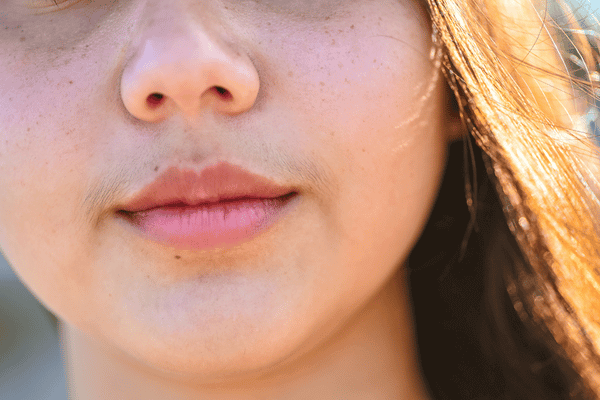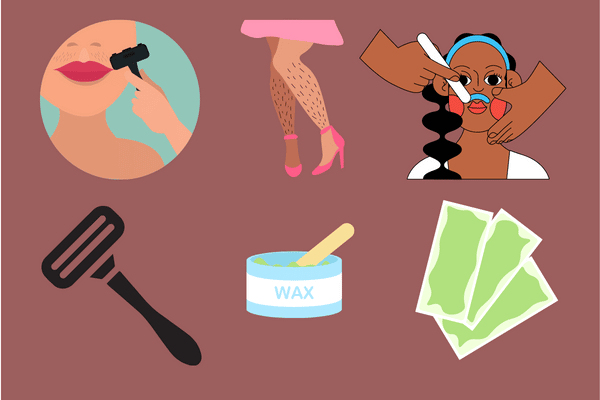A few months ago, I walked to my local Chemist Warehouse in search of body hair bleach because I had woken up disgusted by the black hair visible on my arms. There was no specific reason for it, I thought, till I realised there were small moments that fit together like a puzzle.
Lining up for class in primary when a classmate made a joke about my ‘gorilla arms’. Jokes about not needing a jacket in the winter. A family joke that replaced the chant in the game ‘Buzz off hairy legs’ with my name.
Jumana Khan, a 22-year-old South Asian social media activist for women’s health and menstruation, first began to get comfortable with her body hair while in lockdown. Now, she’s on a “liberating” journey of not removing it at all.
Growing up, she went to a private Catholic school where she was the only Indian student. In Years 5 and 6, she became conscious of the hair on her legs and face when she was teased for “having a moustache” and “more sideburns than the boys.”
“It was always at the back of my mind,” she admitted. “I’m a hairy person, it doesn’t matter if I remove it, there’s always going to be parts of my body that are hairy that aren’t meant to be.”
In a 2008 issue of Sex Roles, Flinders University psychologists Marika Tiggemann & Suzanna Hodgson noted that there had only been four surveys and two experimental studies investigating the removal of women’s body hair thus far. In their study, they found that the vast majority (almost 96%) of participants regularly removed their leg and underarm hair.

“These actions [body hair removal] have come to be accepted as every day and commonplace behaviours that form a ‘natural’ part of good grooming and go unquestioned,” the study observed.
Meanwhile, others like Claudia Sobral, a 20-year-old Italian and Portuguese student, notice a double standard between hair on dark skin and on light skin. While she chooses to shave for the feeling of smooth skin, and because she is impacted by social expectations for women, she understands that women of colour aren’t always offered the same luxury of choice.
“I think having light hair means I wouldn’t be as scrutinised if I didn’t shave,” she said. “I don’t feel pressured to remove my body hair, but maybe that’s also because my hair isn’t very dark. There’s a double standard here because someone that looks like me, with fair skin and light hair, can get away with not shaving.”
Often, it feels like women will be criticised regardless of their choice to keep or remove body hair. For Jumana, body hair has become “an act of rebellion” and a way to feel at home in her own body, especially when the proliferation of the Eurocentric male gaze idolises a standard “that someone like her, a South Asian woman, is not going to look like at all.”
But importantly, as an intersectional feminist, she believes the power lies in having the freedom to make this choice for herself.
“There’s this toxicity in activism right now where it’s all about not fitting into groups if you’re not ‘activist enough’. If you shave, some feminists will say that that’s ‘un-feminist.’ I’m not about that,” she explained.
Within her own family, her Mum and sister have criticised her choice, but she acknowledges that it is “just a reflection of their own conditioning that they haven’t had the opportunity to unlearn or unravel for themselves.”
Australia’s Got talent star Sukhjit Khalsa normalises body hair and used her platform for positivity.
No doubt the topic of body hair will resonate with many South Asians, who have typically been told fair, hairless skin is the ideal. In Beyond The Pale: Skinderella Stories and Colourism in India, academic Annie Paul wrote about this issue, noting: “The ideal of light skin predates colonialism … it is driven by a combination of Western mass-mediated ideologies and traditional Asian cultural values.”
21-year-old Ruaimaa (Ru) Hasan still remembers the days they would bleach their facial hair to blend in with their darker skin.
“It’s an artificial way of making something look ‘normal’ and it wasn’t right. It’s not right of me to change the colour of my natural hair to make it blend or seem as if it’s not there,” they said.
As someone who identifies as non-binary, they explained that not removing body hair is interlinked to their gender identity by actively challenging feminine beauty standards.
“I have heard every kind of negative comment you can hear about body hair and not being feminine, even though feminine beauty exists within every race with so many different physical features,” they told Indian Link.
“I’m not trying to fit into femininity [and] get to have the best of both worlds and embrace who I naturally am, because I’m not forcing myself to be something that I don’t feel I am, which is a woman.”
Jumana acknowledges that she has been impacted by colourism from a young age because of the normalised conversations on skin colour in her community.
“I have a lot of feelings towards facial hair bleaching and the whole ‘complexion issue’ in South Asian culture. They’re so common and insidious in that they don’t hurt you until you catch yourself criticising your own skin colour,” she stated.
Unfortunately, when we are told that we aren’t seen as beautiful from both a Western and South Asian lens in our formative years, many young South Asians spend their lives figuring out how to feel attractive. Whether that be through bleaching, waxing, shaving, it can be a vicious cycle.
Moving forward, our best foot forward is to keep having these conversations about normalising body hair. Parents and other role models can begin to break the cycle of discomfort by speaking to their children early on about self-image and instilling a positive or even neutral view of body hair, and bodies in general.
READ ALSO: Helping your teenager deal with a negative body image





